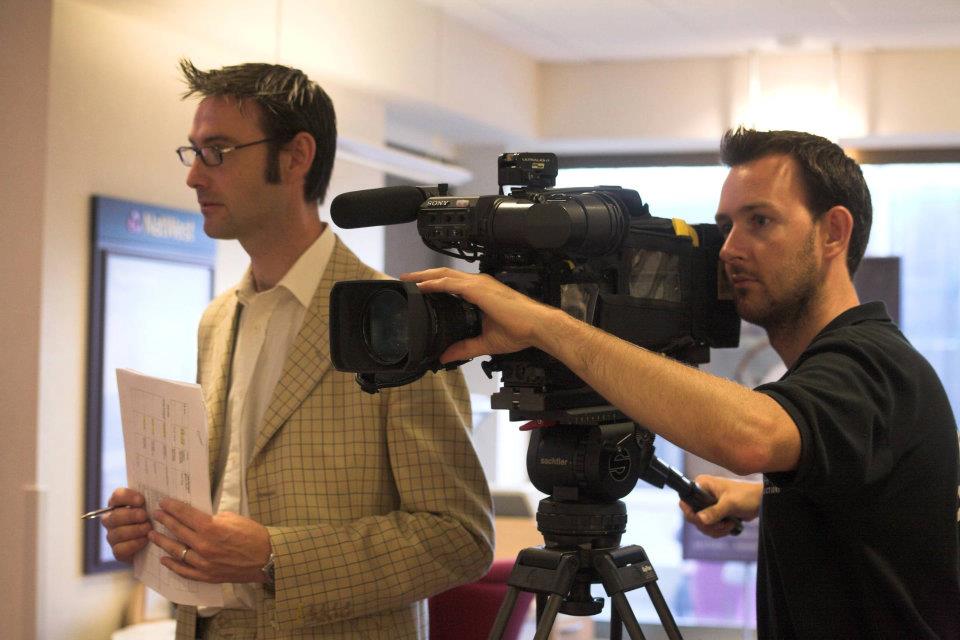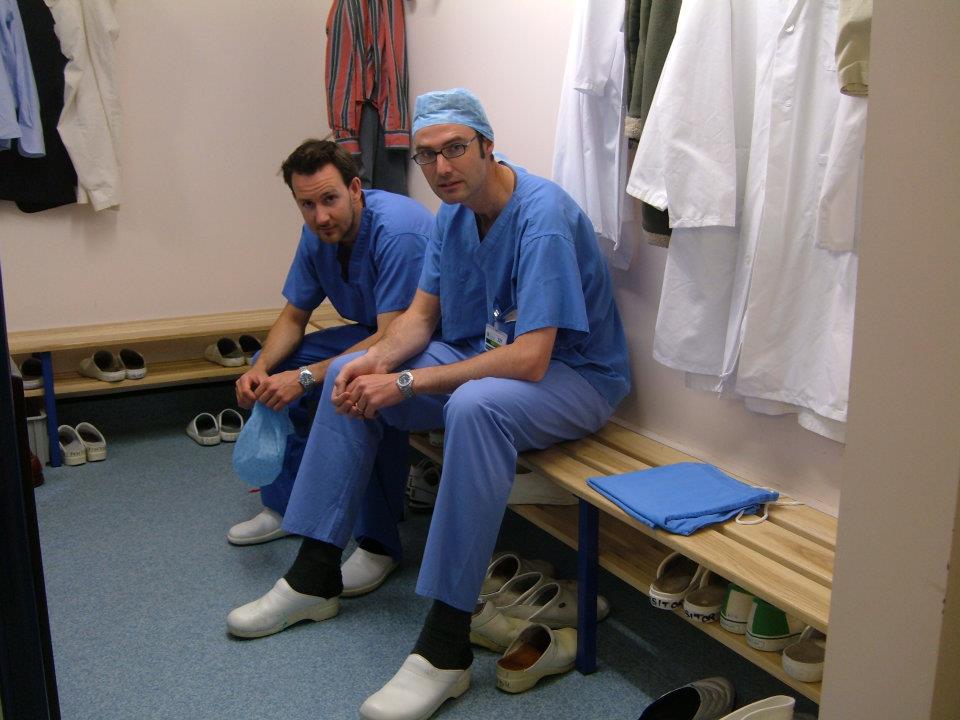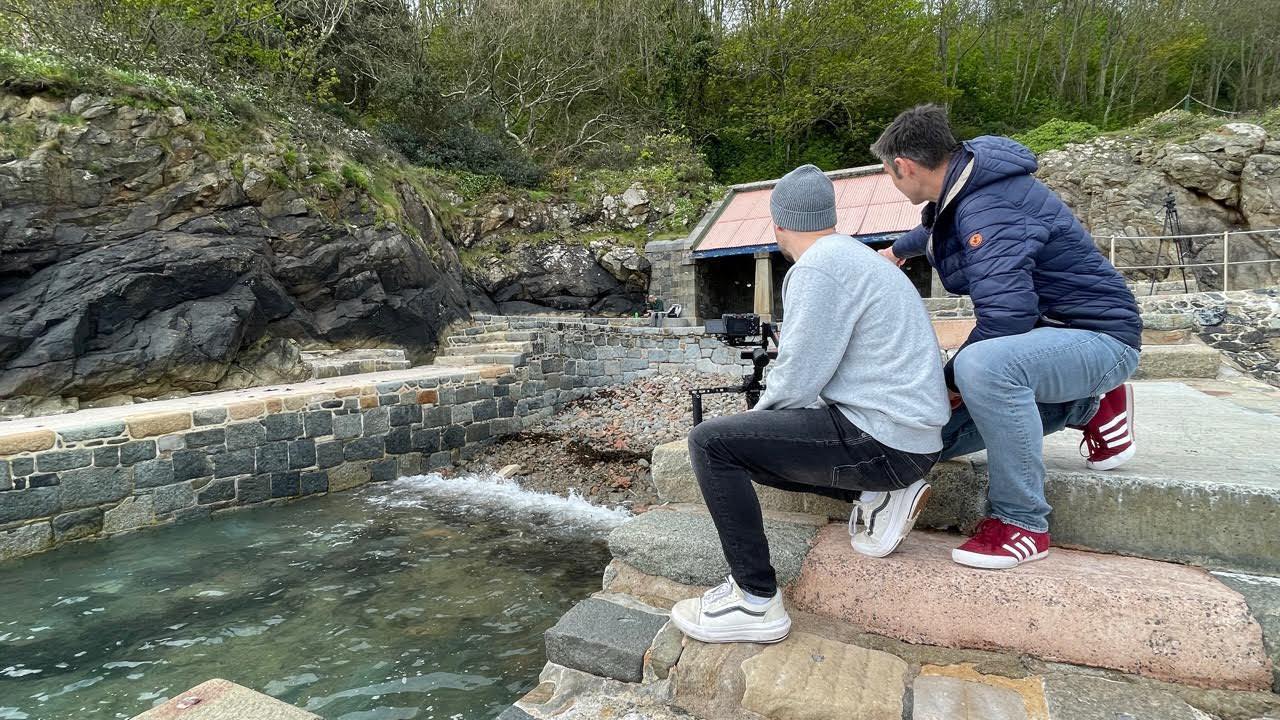

Looking back 20 years, Warren Mauger says he was very naive when he launched his business.
He started Spike in early 2004 with lots of ideas, but no clients.
He had all the kit he needed to make those ideas work, as soon as someone said yes to a pitch. But for the first year there weren’t any clients, and no work to do beyond coming up with ideas and pitching them.
“We were probably quite unusual, because we started from nothing, we didn't even have any clients when we started, or any prospect of getting them actually,” he recalls.
“We were very naive when we started. We didn't even really know how to get work. But we spent every day working full time just making it happen and making it work. And we did work hard, despite not having any work, to make it happen.”

Pictured: Spike launched in 2004 with all the kit, and loads of ideas, but no clients at first.
Warren spent the rest of 2004 pitching ideas to various potential clients – showcasing what Spike could do.
It was one of the Channel Islands’ first video production companies, and while the technology Spike uses has developed, and the interest in using video as a means of communication for corporates, charities, and the community has grown, the ethos behind Warren’s work has never changed.
It all comes down to story-telling.
"We spent the first year just pitching to TV companies,” he remembers.
“We were coming up with all sorts of nutty ideas that we thought might make good TV and other more worthy ones. At one point, we pitched an idea which ended up with us having a meeting with Stephen Fry's agents in London and pitching an idea for a travel series. They were pretty interested but it didn't come off. But they then introduced us to an editor at the Discovery Channel, who we then had a meeting with. We took about six or seven ideas with us, and one of those saw them giving us quite a significant job, which lasted maybe six months or so.
“That was our first major commission on TV.”
Since that successful pitch, Spike’s work has diversified in ways Warren couldn’t have predicted 20 years ago.

Pictured: Warren Mauger launched Spike with Liam Le Guillou, and the pair worked on a number of interesting projects together.
He didn’t have a defined business plan when he launched Spike – which confirms his naivety at the start. But that means he has been able to try out different things over the years.
"I just wanted to go out and do really good work,” he said, “I was really naive going into it, but that's what I set out to do.
“But it has changed. In some ways, it's probably been another six or seven different iterations.”
The people working for and with Spike has changed, and the equipment they work with has seen multiple iterations over the years too.
Edit suites and studios in Guernsey, Jersey, and at one point Dubai, used to take up a lot more space physically, with huge amounts of data stored on hard drives, and everything linked up via desk top computers.
Warren says at the time it was all “cutting edge”.
“We invested in the right equipment at the very start because it's the one thing I've always believed, that if you have the right tools that you can rely on and that do the job then that's not a stress. That enables you to do the work and focus on doing good work rather than always having to sort something out or fudge your way around.
“When we started we did have a good set up. We had proper commercial editing suites with commercial level cameras, and we hired stuff in, which is perfectly normal. We were ready to go. We had most (of the kit) but we didn't know all the processes, we didn't know how to work, so we were constantly outside of our comfort zone.

Pictured: Warren Mauger has completed numerous Epic Challenges with friend Philip Smith.
“I actually think for most of the 20 years, I've probably always lived to some degree outside my comfort zone.
“I think I must like it because I get bored really easily. And so, I think being outside my comfort zone means I've never really been ok. I am always anxious or concerned or worried. I think that makes me maybe a little bit intense sometimes, because I'm always pushing myself in different ways, I just want to do more.”
Outside of work, Warren is well known to many people for his involvement in the Epic Challenges – which started with running seven marathons in seven days in August 2014.
There have been many physical challenges since then too, confirming that Warren must like living outside of his comfort zone.
Warren has pushed himself and Spike in many different directions since launching too.
He’s taken many different opportunities as they’ve arisen.
Now, Spike’s Guernsey operation is based at the Digital Greenhouse, where the business’s suite of allocated desks offer privacy along with access to shared workspaces.
When I visited Warren at work, there were other established businesses working nearby, alongside startups, while meetings are taking place behind closed doors, and events are advertised offering advice to entrepeneurs.
This is a hub of creativity and purpose.
In Spike’s area there is further evidence of creativity and purpose, with laptops, servers, video cameras, microphones, laser scanners, and more all available to take out to any job.

Pictured: Spike has worked on projects commissioned in Guernsey and further afield.
The video editing is still done on computers, with Warren and Josh Pemberton – Warren’s full-time colleague in Guernsey – using high-spec laptops for most of this work.
They also have a purpose-built, portable computer that allows live streaming of events. This means – as one example – that Spike can film Guernsey FC’s matches with slow motion replays at the touch of a button.
None of this was possible 20 years ago, but now Spike can do that easily, along with much more.
“I think the difference is that before, technology was both a barrier, because you had to spend a lot of money to get it, but it was also quite hard to learn how to use,” remembers Warren.
“Whereas now it's much easier to learn the terminology, and it's more accessible.
“To be good now isn't so much about pointing a camera at something, I think the skillfulness now is more about what it always was – the storytelling.”
Warren has never forgotten his background in journalism.
He worked for Channel TV before launching Spike, and as much as he works with technology to produce corporate videos, documentaries, animations, live streams, and much more, he still just wants to tell stories.
“We do a lot of things for charities, particularly recently for the Race for Life, and there are some really, really empowering stories.
“They're brilliant, but there's quite a skill, I think, in actually bringing those out of people, and then putting them together in a way that actually tells the story in an amount of time that engages people well.”
It’s this skill in bringing an emotive story to the fore, that is something no technology can replicate – not even AI, says Warren.
“If you want the human touch, that's where interaction will always beat technology.
“I think, what's the emotion? All of this is...how do you touch people?
“I always used to joke when I worked in news that 'tears make telly’, because, honestly, if you show someone showing emotion, then you’ve nailed it.
"It's all about peoples’ engagement. People really lean into that. I don't think it (AI) is the same at all.”
A recent project Warren has worked on came to fruition during May with the annual Our Race for Life, taking place in Guernsey.
Now organised locally, Spike was tasked with creating promotional videos ahead of the event, demonstrating how the money raised will help fund research into cancer cures.
Warren met three local women who have all been affected by cancer in different ways.
"I've got used to people crying,” he said. "But that's the human emotion. It’s what makes it special. I think people sometimes feel a bit awkward about putting someone crying on a video. But to me, if the person is willing to let that happen, that's where the magic is. Because that's raw. And it's real.”
Storytelling comes in many different forms though, and as the technology they work with has evolved, so have the services that Spike offers.
"The virtual tour service came out of COVID. It came from people trying to sell commercial property. They couldn't send anyone over and there's multiple stakeholders so people asked us to do it. I had no idea what it was, so I looked into it and thought I’d give it a go. Then suddenly we're creating 3D virtual tours, and then that led to architects asking if we could do 3D modelling.
“Now, we can actually create 3D models of any buildings or outside areas.”
With a laser added to the Spike kit list, they can now create images which are made up of layers of individual images ensuring accuracy not possible with past technology.
These scans have been used in planning applications, building developments, and visual tours. They could have much wider uses in the future too Warren says.
Whatever kit he’s using though, Warren is still most enthused about the stories he shares.
"I've never been excited about the technology. It's always been about what we could do with it.
“What I enjoy is finding out about people's stories, whatever that might be.”
This interview was first published in the current edition of CONNECT magazine, Express' sister publication.
Comments
Comments on this story express the views of the commentator only, not Bailiwick Publishing. We are unable to guarantee the accuracy of any of those comments.